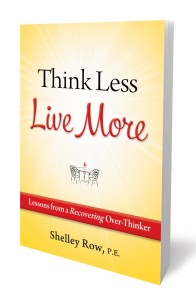 When I first ordered Shelley Row’s book Think Less, Live More: Lessons from a Recovering Over-Thinker, I was intrigued by the notion of learning to not “over-think” things. Indeed, this book does cover that topic. Yet it explores much more than just how to get out of analysis paralysis. The book also discusses how to identify your personal values, learn to set appropriate boundaries for yourself and create a compelling personal vision.
When I first ordered Shelley Row’s book Think Less, Live More: Lessons from a Recovering Over-Thinker, I was intrigued by the notion of learning to not “over-think” things. Indeed, this book does cover that topic. Yet it explores much more than just how to get out of analysis paralysis. The book also discusses how to identify your personal values, learn to set appropriate boundaries for yourself and create a compelling personal vision.
Row, who is an engineer by trade, describes herself as “professionally trained to be an over-thinker.” So much in fact, that when she went to her employer’s Employee Assistance counselor and was asked, “Shelley, how do you feel about your situation?” Row was stymied. “Feel” about something at work? As a professional trained to analyze facts and use logic, Row discovered she was discounting the role that feelings play in decision-making at work.
From that enlightening day in a counselor’s office, Row decided to intentionally “work on feeling.” From there, she began to explore self-development books. Along the way, she met with other counselors and life coaches. As part of organizing what she learned, Row put her thoughts on paper, which eventually turned into “Think Less, Live More.”
Row’s book takes us along on her personal journey – from highly successful, yet restless government executive – to entrepreneur and author dedicated to helping other “over-thinkers” lead more meaningful work and personal lives.
This book was a finalist in the International Book Awards “Self Help” category and I can see why. It’s easy-to-read and light on the “self-help” language that tends to burden the genre. It includes practical exercises that the reader can immediately put to use. Row offers both personal and professional stories to illustrate the eight “lessons learned” as she went on her journey of self-discovery.
The book’s tone is professional, yet light-hearted. I found myself chuckling at some of her observations regarding release of control as it relates to relationships at home. When describing how she loved to “teach” her three-year old sister how to draw, Row says it was an early indication of her love for sharing her knowledge. “My sister would say it’s an indicator of my love for being in control. We’re both right!” she wryly notes.
I thoroughly enjoyed this book. In particular, the concept of “over-functioning” hit particularly close to home. I wrote about it here and here.
In the book’s introduction, Row says that “writing this book was a gift to myself. Now I offer it to you.” This book is indeed an excellent gift, one that you’ll be glad you opened.
Disclosure: some of the links in this post are affiliate links, which means if you click the link a make a purchase, I may receive a small commission. Please know that I only mention items that I think my readers will find value in. However, you should make the final decision as to what is “valuable” to you.
Leave a Reply